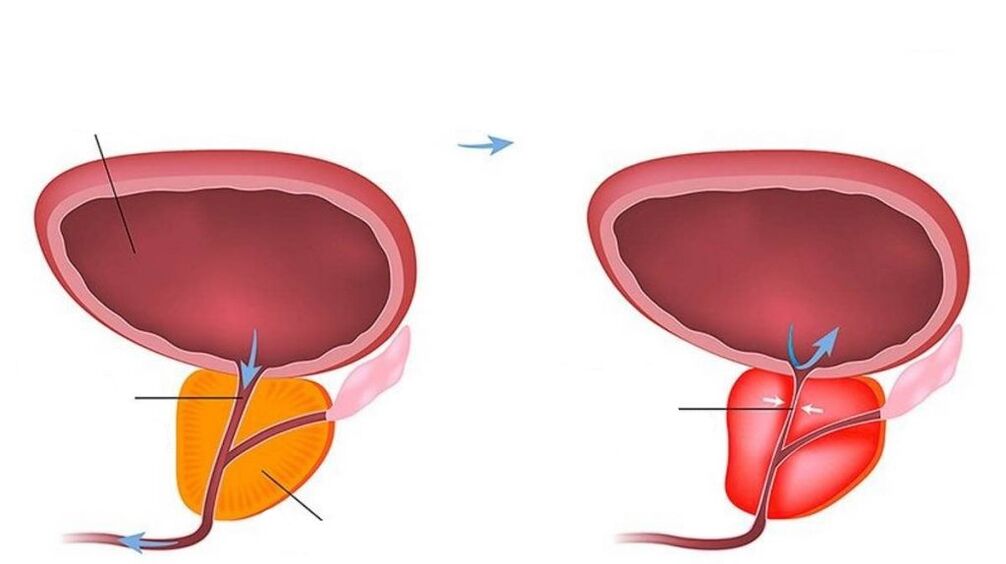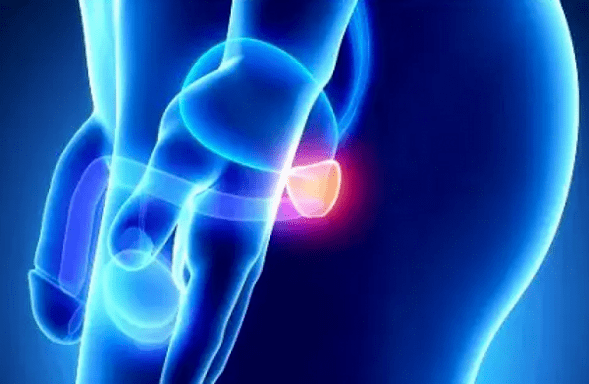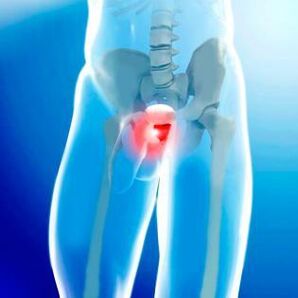Prostatitis is an inflammation of the prostate, also called a prostate. This disease can occur for the following reasons:

- Infections.
- Bacteria.
- Viruses.
- Fungi.
- Long-term use of antibiotics, leading to reduced immunity.
In many cases, the infection enters the body through sexual contact. As a result, stagnation in the pelvic organs and blood circulation is impaired.
There are also non-infectious reasons why chronic prostatitis can develop:
- Sedentary life.
- Improper prostate structure.
- Damage to the perineum.
- Congenital pathologies.
- Swelling of the prostate.
- Low testosterone levels.
- Hard physical work.
- Hypothermia.
- Stress and nervous tension.
The occurrence of this pathology is also possible as a result of the development or ineffective treatment of such diseases:
- Sinusitis.
- Kidney stones.
- Angina.
- Inflammation of the urethra.
In addition, prostatitis can occur due to inconsistent sexual activity and regular interruption of the act, which contributes to the development of stagnant processes.
Some facts to note:
- To maintain a healthy prostate, you should have sex at least twice a week.
- There is no reason to delay urination (this not only contributes to the development of stagnation, but also negatively affects strength)
- Regular use of tobacco and alcohol damages the prostate, so do not abuse it.
How do you know if the prostate is inflamed?
The manifestations of prostatitis can vary considerably depending on the degree of development of the disease. There are 3 stages:
- Discomfort occurs in the lower abdomen. You often want to empty your bladder (with a burning sensation).
- Problems begin in the genital area (erection worsens, pain is felt during ejaculation, ejaculation occurs prematurely).
- In the last stage, the body temperature rises, the pain appears when urinating, the patient trembles.
Important: if we are talking about chronic prostatitis, then in this case the development of the pathology, as a rule, is not accompanied by the corresponding symptoms (or the manifestations of the disease are poorly expressed). The danger of this form is that the deterioration can start at any time.

Treatment of chronic prostatitis with folk remedies
There are many traditional methods used to treat prostatitis. Immediately, we say that each of the methods described below should be used only after prior consultation with a physician. Remember that not only can self-medication be ineffective, but it can also make the problem worse.
In addition, you need to understand that folk remedies do not allow you to get rid of chronic prostatitis completely. It makes sense to use them to prevent a disease or as an adjunct, along with medications and physiological procedures prescribed by a doctor.
Garlic
Garlic is considered quite effective in preventing and treating chronic prostatitis. Recipe:
- Take a few cloves of garlic.
- Put them in a container (for example, a hot one) and pour a quarter liter of boiling water.
- Drink before bed on an empty stomach.
There is also another recipe:
- Take three cloves.
- Pour 200 ml of cold milk.
- Boil on low heat and cook for one minute.
- Insist for half an hour.
- Consume 35 drops four times a day after meals.
Onion peel decoction
Recipe:
- Peel the onions and rinse.
- Pour into a saucepan and pour half a liter of hot water.
- Boil for 5 minutes and leave for 60 minutes.
- Consume a teaspoon three times a day.
Combined intake of golden mustache balm and asparagus juice
To prepare a balm, you need:
- Mix 150 ml of alcoholic gold mustache extract with 500 grams of flaxseed.
- Place in a closed container.
- Shake for 5-7 minutes.
You should drink this balm for 10 days three times a day for a teaspoon, after that for another 5 days, use the asparagus juice the same number of times, 2-3 tbsp. large. Repeat the cycle twice.
Warming the prostate using birch tar
You need to take 3 tbsp. 1 liter of tar and pour it with 3 liters of boiling water. Then sit on top of this mixture for 7-10 minutes. The technique is effective in the early stages of prostatitis. Cannot be used in the presence of hemorrhoids or sexually transmitted diseases.

Aspen bark tincture
Immediately, we say that the collection of the bark should be carried out in early spring, when the leaves on the trees have not yet bloomed. This is very important, as during this period it is more saturated with juice, which gives a healing effect. Collect young bark 5 mm thick.
Recipe:
- Grind 100 g of dried bark.
- Top up with vodka until it completely covers the rind.
- Insist for 14 days and then drain.
- Consume 15-20 ml by mouth three times a day for a month.
Ivan tea tincture
Recipe:

- Grind the leaves of Ivan tea and pour hot water in proportions of 1 tbsp. large. per glass.
- Insist for 40 minutes.
- Clean the herb from the infusion and use a tablespoon daily.
Another recipe involves the use of not only leaves but also flowers. They should be poured with a glass of boiling water. The infusion is prepared overnight. You should take it twice a day for half a glass.
Aloe vera wine tincture with honey
Aloe and honey are products widely used in traditional medicine. To prepare a medicine for prostatitis, you will need:
- 0, 5 kg of aloe leaves (plants must be at least 3 years old).
- The same amount of honey.
- Half a liter of red wine (preferably dry).
You need to mix all these ingredients and insist for 5 days in a dark and dry place. To prevent prostatitis, you should take 1 tablespoon 2-3 times a day. large. throughout the month. Then you need to take a 7-day break and repeat the lesson.
Lotion and soda baths
Soda helps to treat infections that occur during prostatitis. Both the bath and the lotion are prepared according to the same recipe. It is necessary to dilute the soda with boiling water in proportions of 1 tbsp. large. per liter. Before starting the procedure, it is necessary to allow the solution to cool slightly.
Propolis tincture
Prepared according to this recipe:
- Crushed propolis should be poured with pure alcohol in proportions of 1 to 2.
- Place the medicine in a dark and not hot place.
- Infuse for 14 days, shaking occasionally.
- Strain at the end.
This medicine should be taken on an empty stomach three times a day, mixed with warm milk. Proportions: 15 drops of tincture per 100 grams of milk.
Tincture on the root and leaves of ginseng
10 units of ginseng require 1 unit of alcohol diluted with water in a ratio of 1 to 1. Insist for several days. Consume once a day. This recipe is not recommended if you suffer from insomnia or hypertension.
Alcoholic infusion of aralia roots
Aralia has many beneficial properties, which, among other things, have a positive effect on the condition of the prostate. But the problem is that this plant grows mainly in eastern countries (Mongolia, China, Korea). In our latitudes, it is quite difficult to obtain the roots of aralia.
If you have succeeded, here is the recipe for the tincture:
- Pour 20 g of roots with 70% alcohol in a quantity of 100 ml (vodka will also work).
- Insist for several days.
- Drink 10 drops 3 times a day.
The drug is effective not only for prostatitis. It also provides an opportunity to deal with sexual dysfunction. However, in the presence of cardiovascular disease, this infusion can not be used.
Infusion of dill in port wine
Mix 100 g of medicinal dill with 1 liter of port. The drug should be prepared within 3 weeks. Drink half a glass before meals. The tincture reduces inflammation of the prostate.
A mixture of nuts and honey
For a long time, walnuts are used to restore male strength. To prepare a medicine for prostatitis, you must:
- Cut 5 walnuts.
- Add half a glass of honey.
- To mix well.
Consume at the beginning of the day for 1 tablespoon. large.
Chamomile tea and bath
To make chamomile tea, you need to pour 200 ml of boiling water into 1 tbsp. large. dried plant and insist for several hours. Consume three times a day on an empty stomach. The medicine allows you to treat the infection and relieve the inflammation.
A bath with chamomile infusion is prepared as follows:
- 5 tablespoons. large. Add dried chamomile with hot water.
- Boil for several minutes and cook for about 2 hours.
- Add to the bath during the bath.
Tea with chestnut shell
Remove the shell from the chestnut fruit. Fill with hot water, boil for a few minutes and use inside. The taste of the drink is not very pleasant, so you can add a little honey.
Bathroom with pine needles
You need to boil the branches of a coniferous tree (ideally pine) and throw it in the bathroom. The water temperature should not exceed 38 ° C. The raw materials can be collected independently or purchased at the pharmacy.
Pumpkin seeds
The last folk remedy for prostatitis on our list is pumpkin seeds. They should be consumed daily in 30 pieces. Helps both prevent the development of pathology and reduce the pain of symptoms.
Can prostate inflammation go away on its own?
Do not even expect prostatitis to go away on its own. This is not possible even in the case of the first stage. Unless appropriate measures are taken, the disease will only progress and therefore progress over time.
See your urologist immediately if you have symptoms. He will prescribe the necessary medicines. Also, the treatment of prostatitis, as a rule, includes physical education and proper nutrition. In some cases, immunomodulators and antidepressants are prescribed.
What is the risk of prostatitis and how does it manifest?
Determining the presence of inflammatory processes in the prostate is quite simple. Prostatitis is not a serious danger to human life. However, without special medical care, the pathology can cause serious discomfort, limiting life.
If the prostate is inflamed, then this leads to discomfort in the perineum and lower back. The disease is often accompanied by pain. It can be both painful and intense. In particular, pain is associated with men who do not have permanent sexual intercourse.
If there are infections, mucus or pus may appear at the outlet. If treatment is not started in time, this will eventually lead to a deterioration in sperm quality.
Can chronic prostatitis be completely cured?
Statistics on the treatment of prostatitis show that relapses occur quite often. In many cases, the recurrence of the disease is due to the fact that patients do not have enough stamina to get rid of the pathology completely.
Of course, treating prostatitis requires a lot of patience and significant financial costs. So, for example, if there is an infection and the doctor prescribes antibiotics, then in no case should he stop halfway, even if the disease has stopped feeling. If you do not complete the course of medication, then the pathogens will recover after a while and, in addition, will be immunized by the medications you were taking.
Thus, although recurrences often occur in chronic prostatitis, the patient's condition depends largely on himself. If you strictly follow the doctor's recommendations, then the signs of inflammation will not be felt for a long time and may disappear forever.
Tests for prostatitis
In all cases where prostatitis is suspected, the following procedures are prescribed:
- Blood test - makes it possible to identify inflammation by looking at the level of white blood cells and the rate of erythrocyte precipitation (ESR).
- Urine analysis - performed several times. It allows you to determine the increased level of bacteria and white blood cells.
- Prostate secretion study - allows early detection of prostatitis, prostate cancer and infertility.
- Urine culture - allows you to determine the susceptibility of bacteria that caused prostatitis, thus choosing the right antibiotics.
In case of chronic prostatitis, a urine sample of 4 glasses is taken. This test makes it possible to understand exactly where the infection is located. The analysis is performed as follows:
- The patient fills the 1st tube with urine.
- After that, urination continues to the 2nd.
- The doctor rubs the prostate. The secret that stands out is considered the 3rd test.
- The urine residue that comes out after the massage is the 4th sample.
Further laboratory tests are performed:
- If the bacteria are in the 3rd or 4th part, it means that the prostatitis is bacterial.
- If there are more than 10 leukocytes in the same samples, then there is inflammation of the prostate.
- If there are more than 10 leukocytes, but the bacterial flora is normal, then this may indicate the presence of chlamydia and other infections.
In the latter case, scraping of the urethra and mucosa is obtained, which makes it possible to detect sexually transmitted microorganisms.
In some cases, with digital rectal examination, adenoma and prostate cancer are suspected. This condition is one reason for the diagnosis, in which a blood test is performed to measure the level of PSA (specific prostate factor).
Note: PSA sampling is performed no earlier than 10 days after rectal examination.
What tests are done to diagnose prostatitis
For the treatment of prostatitis, antibiotics, antibacterial drugs (non-steroids), as well as drugs that increase immunity and improve blood supply can be used. However, it is impossible to prescribe the most effective drug treatment without prior diagnosis, which makes it possible to understand the form of the disease.
Traditionally, an ultrasound examination (ultrasound) is performed if acute prostatitis is suspected. With this method, the doctor can:
- Determine the volume and density of the prostate.
- Find out if the venous plexus of the prostate is swollen.
- Look for signs of abscess.
In some cases, endoscopy is prescribed, but in acute prostatitis, this method is contraindicated.
If prostatitis is accompanied by a neurogenic urinary disorder, then the following procedures may also be prescribed:
- The introduction of catheter catheters to determine and record the urethral pressure profile.
- Myography, which allows you to evaluate the work of the pelvic floor muscles.
- CT and MRI, if there are conditions for prostate cancer or non-inflammatory prostatitis.
As part of conservative treatment, laser treatment, herbal remedies, magnetotherapy, electrophoresis, mud baths and many other procedures can be prescribed. If this approach is ineffective, then surgery is required.
Types of ultrasound examination for various forms of prostatitis
According to statistics, in about 80% of cases of chronic prostatitis, disease-causing particles can not be detected by laboratory tests. However, palpation does not in all cases allow us to rely on a correct diagnosis, as obvious structural changes do not always occur in the prostate.
Even when it comes to chronic infectious prostatitis, bacteriological analysis sometimes proves to be minimal. The diagnostic error, as a rule, is due to the fact that the germs accumulate in the tissues, but do not enter the secretion, which is taken in the laboratory.
In this regard, ultrasound is almost always prescribed along with tests. This procedure allows not only to detect changes in the prostate, but also to dynamically monitor the improvements that occur during treatment.
In modern diagnosis, two types of ultrasound are used:
- Transverse.
- Intra-abdominal.
Each of these techniques has unique advantages and disadvantages.
Structural method
In this case, an ultrasound machine is inserted into the patient's rectum. The method provides excellent imaging and allows you to gather the most complete information about the condition of the prostate.
Contraindications:
- Hemorrhoids and cracks in the anus.
- Postoperative rehabilitation period.
- Benign and malignant tumors.
Transdermal method
The prostate is examined through the anterior abdominal wall. The method allows you to determine the size and boundaries of the gland, as well as the symmetry of its lobes. The disadvantage of such an ultrasound is that not every hospital uses equipment whose quality allows reliable information on the condition of the tissues to be obtained.
What are the possible consequences if there is no cure for prostatitis?
If prostatitis is not treated, then it can cause such complications:
- Prostate abscess, which requires immediate hospitalization and surgery.
- Formation of cysts and stones in the prostate, causing severe pain and requiring long-term treatment.
- Cystitis (inflammation of the seminal vesicles), which is treated only in a hospital setting.
- Hardening of the prostate, which causes urinary problems.
- Infertility.
What is the purpose of prostate massage?
Prostate massage is a procedure performed in all cases of chronic prostatitis, with the exception of massive prostatitis. It is also appointed in such situations:
- Lack of orgasm.
- In case of disability.
- For diagnostic purposes (allows you to detect inflammatory processes).
Many men have some prejudices in prostate massage, subconsciously identifying it with homosexuality. In fact, this procedure allows you to prevent the development of prostatitis, remove infected secretions, prevent the development of stagnant processes, improve blood circulation and increase male potency, increasing the quality of sexual intercourse.
However, there are situations in which prostate massage cannot be performed:
- Severe inflammation of the prostate.
- Tumor (both benign and malignant).
- Urinary tract infections.
- Hemorrhoids and cracks in the anus.
- Logical form of prostatitis.
- Tuberculosis of the prostate.
- Violation of urination.
- Worsening of chronic prostatitis.
Does chronic prostatitis interfere with normal sex and conception?
Chronic prostatitis usually has no sexual problems. But it also happens in another way. It is very understandable that inflammation of the prostate causes discomfort (not only physical but also psychological). Painful sensations can make it difficult for a man to become intimate with a partner. At the same time, psychological factors can lead to erection problems.
Separately, it should be said about the infectious form of chronic prostatitis. In this case, during sexual intercourse, there is a risk of transmitting bacteria or fungi to the partner.
Tip: if you decide to conceive a child, make sure you have been tested and make sure there is no infection. And if found, follow a course of treatment.
Why is it important to have a regular sex life with prostatitis?
For the body to function properly, it is important to ensure that all its needs are met. The condition of the prostate gland has a significant impact not only on sexual activity but also on the ability to conceive. This is because the secretion produced in the prostate is the part of the sperm that is responsible for the vitality and activity of the sperm.
When inflammation of the prostate occurs, metabolic processes in the cells of the gland are accelerated, as a result of which toxins are released, which accumulate in the secretion. As a result, at the time of orgasm, these harmful substances leave the body with the sperm, helping to normalize the prostate and accelerate recovery.
There is another important point: with prostatitis, inflammatory processes occur, due to which blood flow deteriorates. With sexual arousal, the blood supply to the penis increases significantly, and at the time of ejaculation, the pelvic muscles contract. All this has a positive effect on the condition of the gland and helps treat prostatitis.
How likely is infertility to chronic prostatitis?
In the early stages, prostatitis is not a barrier to conceiving a child. In some cases, there are erection problems caused by physiological and psychological factors. But with the right treatment and understanding on the part of the partner, the problem can be solved.
It is a very different matter if you ignore the presence of prostatitis for a long time. The development of pathology can lead to a decrease in sperm quality: the sperm will become insufficiently active and will not be able to reach the point where conception occurs. In addition, this problem can not always be detected by the results of analyzes.
If you have prostatitis and can not have a baby, see your doctor. In addition to a course of treatment aimed at eliminating inflammatory and infectious processes in the prostate gland, as a rule, diet and vitamins are prescribed. Although they do not increase the chance of conception, they strengthen the immune system, which helps prevent the formation of new infections.
What to do if you can not conceive a child for a long time?
Doctors say that in a normal state, conception should occur within a year after regular and unprotected sexual intercourse. Otherwise, you should see a doctor for a complete examination.
A man is advised to undergo the following procedures:
- Spermogram - allows you to determine the number of active sperm, as well as evaluate the chemical and physical composition of the sperm.
- Genital ultrasound - aims to study the structures that are responsible for the formation and excretion of sperm, as well as to identify problems with the blood supply.
A wider range of procedures is provided for women:
- Estimation of basal temperature in 3 menstrual cycles, followed by programming.
- Genital ultrasound.
- Hysterosalpingography - an image of the uterus and fallopian tubes to assess their anatomical structure and suitability.
- Hysteroscopy is an ultrasound examination of the uterine cavity.
- A blood test to determine hormonal parameters in the endocrine system.
In some cases, problems with conception arise due to the incompatibility of the spouses. To determine the presence of this problem, a post-brain test is prescribed and a genetic test is performed.





























